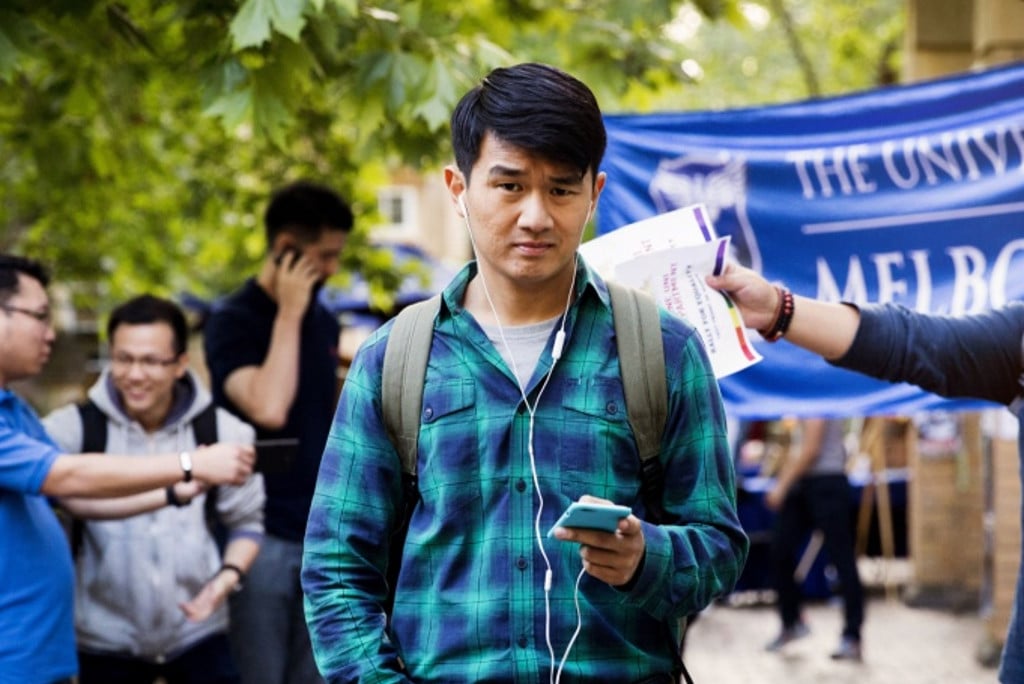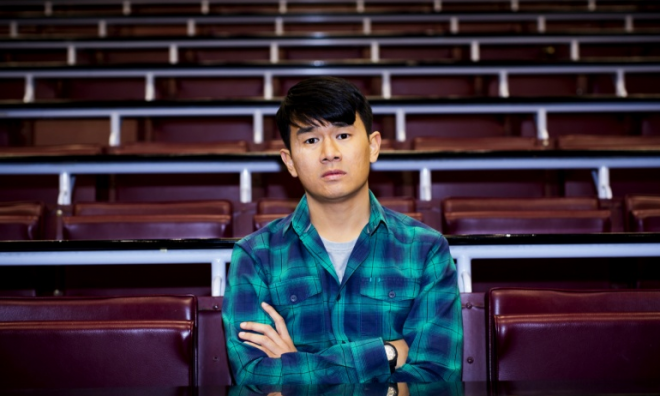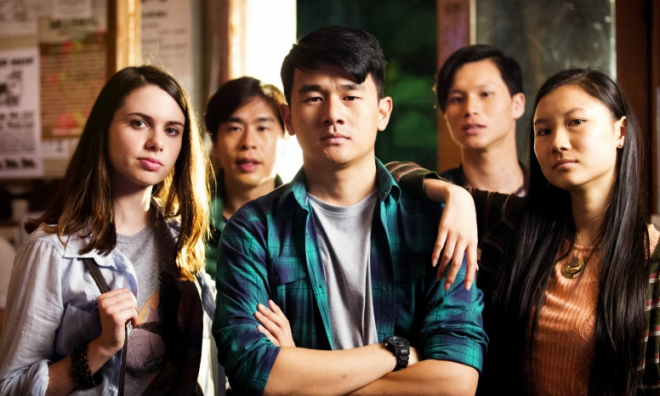Talking Trump, ‘The Daily Show’ And A Big Return To Melbourne Uni With Comedian Ronny Chieng
"I wanted to tell a story which I felt only I was in a position to tell."

You probably already know a fair bit about Ronny Chieng: the Malaysian-born comedian won Best Newcomer at the Melbourne International Comedy Festival in 2012 and his star has kept rising ever since. A regular on the Australian and international comedy circuits, Ronny got a big break last year when he was added to the brand-new roster of correspondents on The Daily Show with Trevor Noah — arguably one of the best gigs in comedy.
While Ronny’s back in the country for this year’s MICF, I have a phone interview with him. It’s also just ahead of the premiere of his new pilot, International Student, a semi-autobiographical series about his time at Melbourne Law School airing on the ABC’s Comedy Showroom later this month. The Showroom is kind of a fight-to-the-death between new TV shows created by the likes of Lawrence Mooney, Eddie Perfect and The Katering Show‘s Kate McLennan and Kate McCartney. The episodes will be streamed on iView, the ABC gauge responses to each, and the most popular pilot gets picked up for a full series.
Ronny and I sit on either end of the line as a Telstra Call Connect operator, unflagging in her seriousness, explains to us that we have just 15 minutes to chat, after which time a tone will sound and the call will end. I hear Ronny chuckling on the other end of the line. When the operator rings off, it feels a little like we’re naughty schoolchildren.
Ronny: Oh my god, that was the most formal thing I’ve ever heard.
Junkee: Yeah, it’s really intense.
Was that human, or was that a robot?
I mean, human? But who really knows.
She’s like a robot.
So you’re back in Australia, how’s that?
Yeah, it’s cool, man. It’s like coming home. I lived in Melbourne for ten years and I studied here. I started comedy here. So to do the MICF, it really feels like a homecoming. My friends are all here; my peers are here, you know? It’s great. I also love the people who come and watch my show.
So you’re on The Daily Show now, which is pretty cool.
Thank you.
You know, you’re welcome. What’s the biggest challenge working there?
Biggest challenge? Aw man, I mean it’s… it’s doing the show, right? That’s the challenge. Trying to make a show every single day — well, four days a week — and trying to live up to the legacy of the show. The show pokes fun at politics in a very important way, and so everything we do has to be of that standard. We can’t just do lowbrow stuff. We have to come up with the right point of view and we have to express it correctly. We have to put a lot of thought into what we do and how we do it. So doing the show is challenging, and it’s a real privilege to do it.
I feel like we all want to do work that matters, right? Like, no matter who we are or what we do — whether you’re a chef, you’re a construction worker, you’re a journalist or you’re a TV writer — whatever you are, you want your work to matter. I’m very honoured to be part of a show that I think is important. The stuff that The Daily Show does, it matters — especially in an election year. I think it’s the best job in comedy.
That’s awesome. I have to ask: what’s it been like working in an election year?
Yeah, it’s crazy. America’s presidential elections are so intense, and they last for so long, especially with all the cable news channels covering it 24/7. It’s the reality show that never stops. It’s like The Truman Show. It just doesn’t stop.
You know, I think it’s fair to say [2016 is] crazier than most, due to the Trump Effect. It’s intense, man. Every day there’s something new, something crazy being said, and it’s hard to do comedy when things are already so crazy, right?
It’s totally bizarre.
You almost don’t need to add a joke to most of what’s going on. So, you know, it’s been a blessing and a little bit of a challenge.
If Donald Trump gets elected the U.S. will finally have a leader strong enough to fire ISIS #DonaldTrumpforPresident
— Ronny Chieng (@ronnychieng) June 17, 2015
You’ve worked a lot in Australia, and now in the US, do you think there’s a difference between the comedy circuits?
Yes, definitely. I think the US is a bigger market, so there are more opportunities, more jobs. It’s also — the style is a little different. In Australia we come from the ‘comedy festival’ system, and that’s very different to the ‘comedy club’ system that most comics in the US come out of.
In fact, there is no comedy festival in the US. I mean, the closest one is Just for Laughs, but even that is in Canada and it’s a TV thing. Whereas in Australia we do a lot of one-hour, festival-style comedy shows. Stylistically, that’s a huge difference right there. In the US they’re coming up with the five-minute or the ten-minute shows. They take years to do it.
Where do you think your favourite place is to do stand up?
Man, I love it everywhere. I love it everywhere I can do well. In Australia I’m very lucky; wherever I go, I get fans coming out to watch me in big theatres. But I love the challenge of performing in America. That’s where all my comedy heroes come from, so it’s nice to be able to perform there as well. It’s tough, it’s tough for me to say which one I like the best. So far I think I’ve been very lucky.
So I watched your TV show last night, International Student.
Oh, you watched it!
Yeah! I watched it. It was great — great fun.
Cool!
I’m a Melbourne Uni alumna so it was fun to see it shot in the uni.
Yeah! Yeah, you get it.
What was it like filming at Melbourne Uni, with student volunteers and local actors?
Oh, it was awesome because I visualised the story at Melbourne Uni. That’s where I went, so when I was writing the story that’s what I was thinking of. I thought we would have to end up faking the locations, but Melbourne Uni let us film on campus which was awesome. We literally filmed in the places I had in my head. In television that’s really rare. It was crazy to go back there because I haven’t been there in a while, but I recognised the Baillieu Library and all these old stomping grounds.
Why did you choose to make a pilot about your time as a uni student?
I wanted to tell a story which I felt only I was in a position to tell. And I think the international student story is a little bit underrepresented. That’s my story — me and my friends. We came to Australia to study for a few years, and then we stayed awhile, and then all my friends left. It’s almost like a dream; like it didn’t really happen. So I thought it would be cool to try and capture that moment, just for the record, and be like, “Hey, this is what happened, this is how a lot of people come here”.
I wanted to tell a story that hopefully you don’t have to be an international student to like. You don’t have to be Asian to like it; you don’t have to even be a university student to like it. I was trying to capture this time in our lives when we’re, like, 19 — around that age where you have no idea what you’re doing but you think you do. You’re expected to make all these important life decisions for the first time because you’re away from home, and you’re trying to fit in when you don’t really know who you are. All that awkwardness. That’s really what the story is about: trying to fit in and knowing when it’s okay to not fit in. Figuring that stuff out — figuring out who you are.
Some of the stuff in that first episode is pretty out there. How much of that is based on your real life experiences?
A lot of characters are based on real people so I’m probably going to get sued. You should watch the pilot before it gets taken down.
I mean, university, you remember it, right? The characters at university are prime for parody. Everyone who is 19 is stupid, so stupid. It’s just a bunch of stupid guys all jammed into this pressure cooker. Especially in the law faculty, everyone thought they were awesome. You put that all together, you squeeze it together, and it becomes fireworks.
So if the show gets picked up for a series, do you have any thoughts about where you’ll take it beyond that pilot?
I don’t know if I’ll get a series. Hopefully I do. I feel like there’s enough there to make a whole series about it. One of the difficulties of making a pilot is creating a whole world and telling a story in the one episode. I think we did okay doing both those things. And I hope that we’ll have more room to play. I do think there is a lot of room to go with this.
And how did writing a TV show differ from writing stand up?
Oh, totally different. It was a completely different skillset. I had to learn from scratch. I’m very lucky, my co-creator Declan Faye is a very experienced TV writer and he helped me translate my ideas to television.
Look, I mean, we wrote this in a year and I’m glad I had that time. It was like a Masters in Screenwriting. It was very challenging to write a screenplay; you’re trying to set up the universe and tell a story. And you’re writing for other characters as well, not just writing for yourself. I had to think production-wise, because in stand-up you’re just talking on a stage but in television you have locations and environments and different characters. If you’re not careful, all your characters end up sounding like you. You have to give them some little quirks and nuances. It was an awesome learning experience. Even if I don’t get the series I’m really happy I did it because I picked up a lot of skills.
So what’s next on the agenda for you? Now that the pilot’s coming out and you’re in America and you’re getting a bit of success there, what are you looking at on the horizon?
Oh my god, on the horizon?
Yeah, on the horizon.
This isn’t enough for you? I’m already doing The Daily Show, I’ve got a pilot coming up, I’m doing stand up.
Yep. You’ve got to be doing it all.
I can’t do anymore! No, really, I’m hoping this pilot goes to series and I can work on that, you know? And I’m hoping to keep doing The Daily Show, and I can get better at that.
–
International Student will be on ABC iView from April 27.
–
Matilda Dixon-Smith is a freelance writer, editor and theatre-maker, and a card-carrying feminist. She also tweets intermittently and with very little skill from @mdixonsmith.

